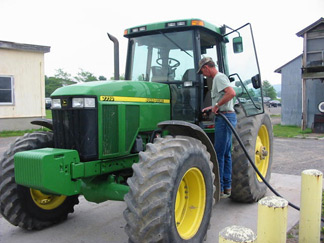Cornell's farm vehicles just got greener and cleaner with use of biodiesel
By Susan S. Lang

To pump up enthusiasm for greener, cleaner fuel on the Cornell campus, Cornell's Farm Services' 20-plus vehicle fleet of trucks, tractors, a bulldozer, a backhoe and other farm equipment has been running on B20 biodiesel exclusively for more than a month. The environmentally friendly farming experiment is going well.
B20 biodiesel consists of 20 percent biodegradable fuel made from soybean or canola oil, a renewable resource that reduces particulate emissions by 17 percent while increasing engine life.
"We have been running this fuel in our entire fleet -- using up to 1,000 gallons a week during the peak summer months -- with complete success," says Andrew C. Lewis, farm supervisor of Cornell's Farm Services. If the fleet continues to run smoothly on B20 biodiesel, Lewis said that the College of Agriculture and Life Sciences (CALS) will likely switch more of its vehicles to the cleaner fuel starting next summer.
"Even though the cost of biodiesel is currently higher -- about 14 cents a gallon more -- than petroleum diesel, CALS believes it is the right thing to do for the environment and wishes to make it an example of a proactive approach," says Lewis, who notes that switching to biodiesel requires no vehicle adaptations. Also, he added, the more that biodiesel is used nationally, the greater the economic incentives to push its price below that of petroleum diesel.
Cornell's Farm Services maintains nearly 1,000 acres of nonresearch cropland near the Cornell campus, manages Cornell compost operations and facilitates research projects for many CALS departments.
Get Cornell news delivered right to your inbox.
Subscribe